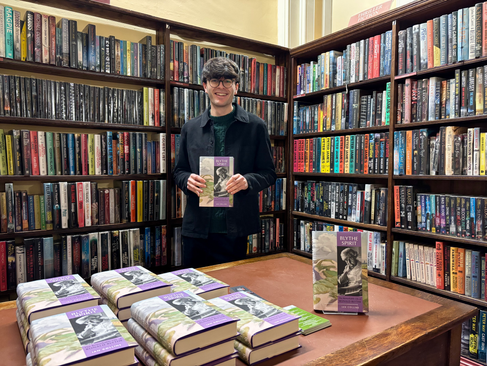Ian Collins
- James Phillips
- Jan 31
- 3 min read

We warmly welcomed Ian Collins for our first event of 2025, speaking about Blythe Spirit, his compassionately curated, intensely researched biography of local author, Ronald Blythe.
It was 10-15 years into their friendship when the topic of biography was broached, and it was agreed that Ian would write it. Ian had unparalleled access to Ronald’s spoken words as well as to private documents. Ian decided to write gently in the background respecting Ronald’s cherished privacy. The result is a book holding 35 years of intimate friendship, a ‘love letter’ to him.
We found ourselves traversing 100 years, starting with Ronald growing up impoverished in London. He lived in one room with five siblings, sleeping on the floor. Although he signed up for the Second World War, ‘he couldn't hurt a proverbial fly’. Ian explained that military training did not suit him as he couldn’t give orders (or even ask direct questions), let alone be part of a war machine. However, he wrote about people in war, proving a much better journalist. Akenfield was a product of his interest in people. Ian revealed that Ronald was heavily influenced by his father who fought in World War One and struggled to settle back into civilian life, returning a ‘complete wreck’. He spent the rest of his days a grave digger, silent, inspiring the parallel character in Akenfield. His father’s story was revealed on his death bed, but proved formative to Ronald, instilling a deep reverence for the gift of life.
Ian acknowledged that there were parts of Ronald’s life that were difficult to understand, but didn’t shy away from presenting a ‘candid portrait’. For example, he didn’t have any sentimentality. He was known to keep cats, albeit nameless and never summoned vets when death was drawing near, believing all living creatures had their time. However, Ian reassured us that there was a local vet who would tend to them secretly, without Ronald being any the wiser. He explained that his biography ‘held nothing back’ but that ‘everything magnifies his achievement as a writer’. It was surprising to hear of idiosyncrasies, from naturist sunbathing with an artfully placed floppy straw hat, to his ‘medicinal’ consumption of sherry and gin. Ronald never took medication up until he was 90. He was blessed with an internal fortitude, and with it ‘always tried to fight on the front line of life’. He invited in casual visitors, friends and strangers alike. He found everyone fascinating -- no one was ever boring -- although he did always like people to leave.

Ian shone light on the everyday. One trauma, inherited from an austere childhood was lack of money. Whilst it took him some time to get established, he published over 70 books. He had many bank accounts squirrelled away, yet he lived simply and modestly. He didn’t have any real ‘gadgets’, no washing machine or dishwasher, just a television. Not even a phone, preferring to communicate via letter. He lived almost monk-like, not even owning a torch with his excellent night vision. When the question arose as to whether he was ever in love, Ian knew the answer. No. He had physical relationships but never kept anyone too close. It was writing that came above all else. Ian said he was ‘full of love’ just not in the way we understand it. Everyone was in his social circle, living or dead: he would have conversations with those long since passed.
It was Ian’s recollection of Ronald’s last moments that awed the room into a different temporality and an esteemed silence. The brick floor of his house had wildflower imprints from when the clay was left drying. When he was dying Ronald said he wanted to stand up. He got up, putting his bare feet on this beloved wildflower meadow for one last second, before returning to bed, saying ‘thank you’. Then he died. Ian summed up his subject as an ‘ecstasist -- overwhelmed by the beauty of the world’. We were left adaze in the wake of Ian’s loving testimony of a remarkable life which has been so honoured by his biographer.
James Phillips





Comments